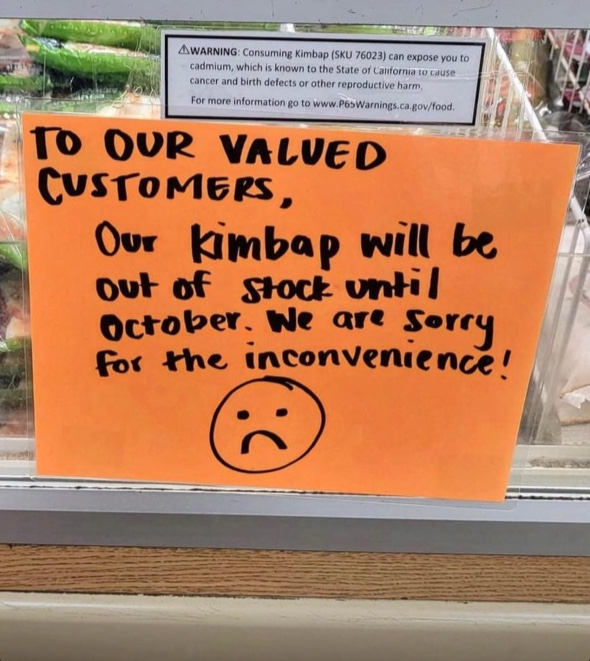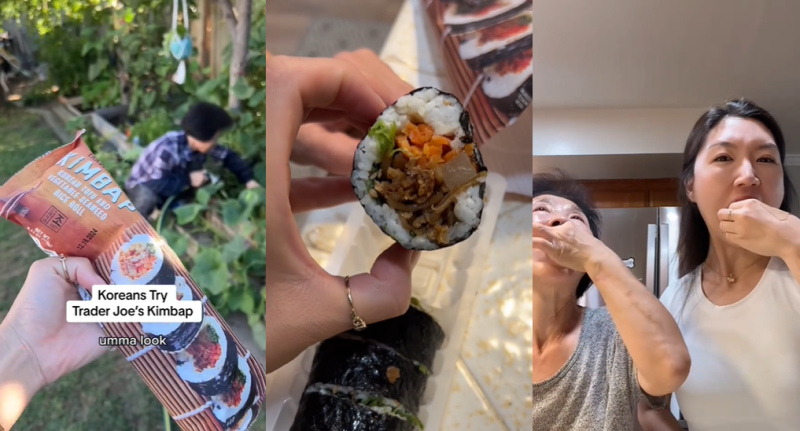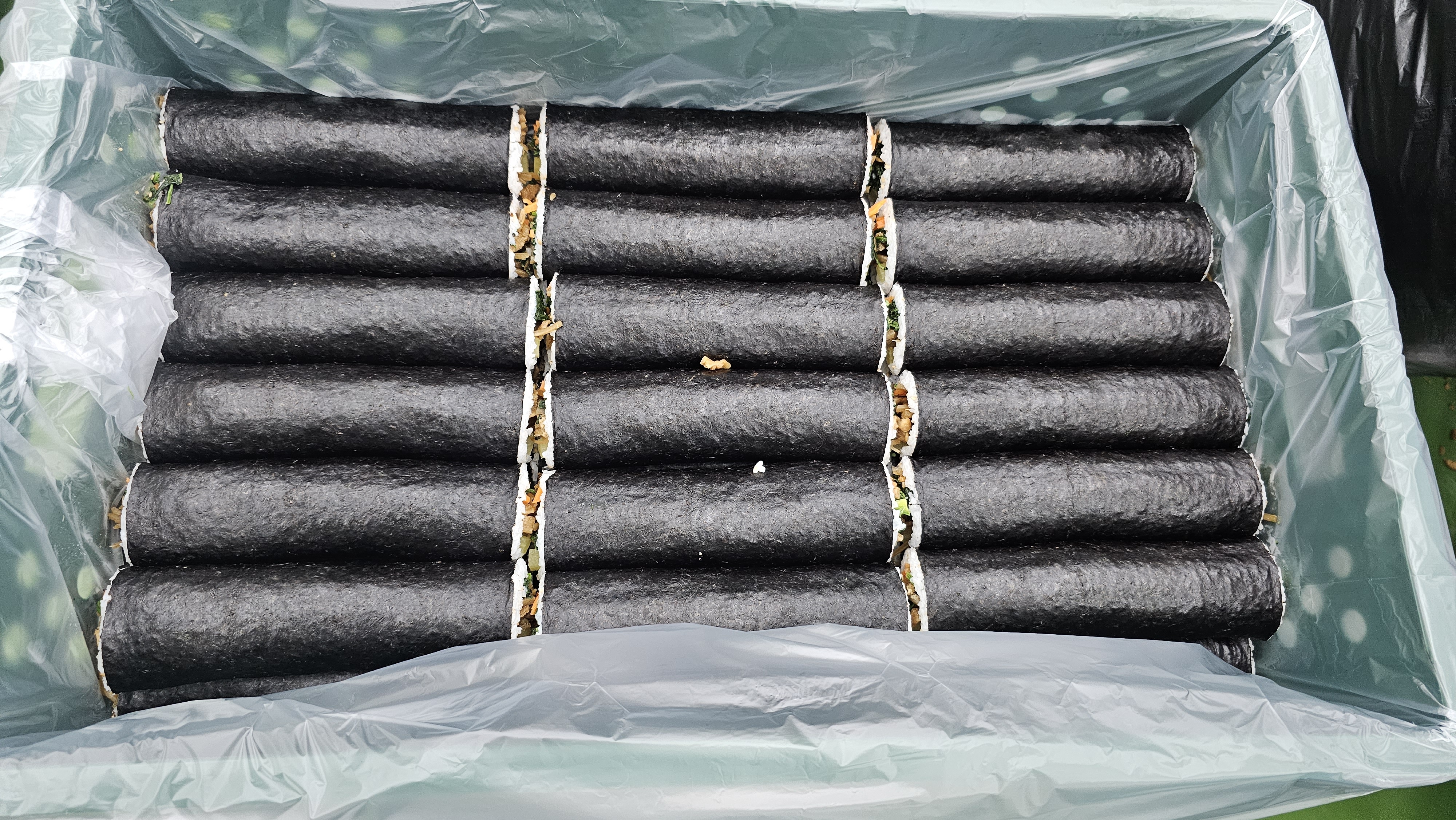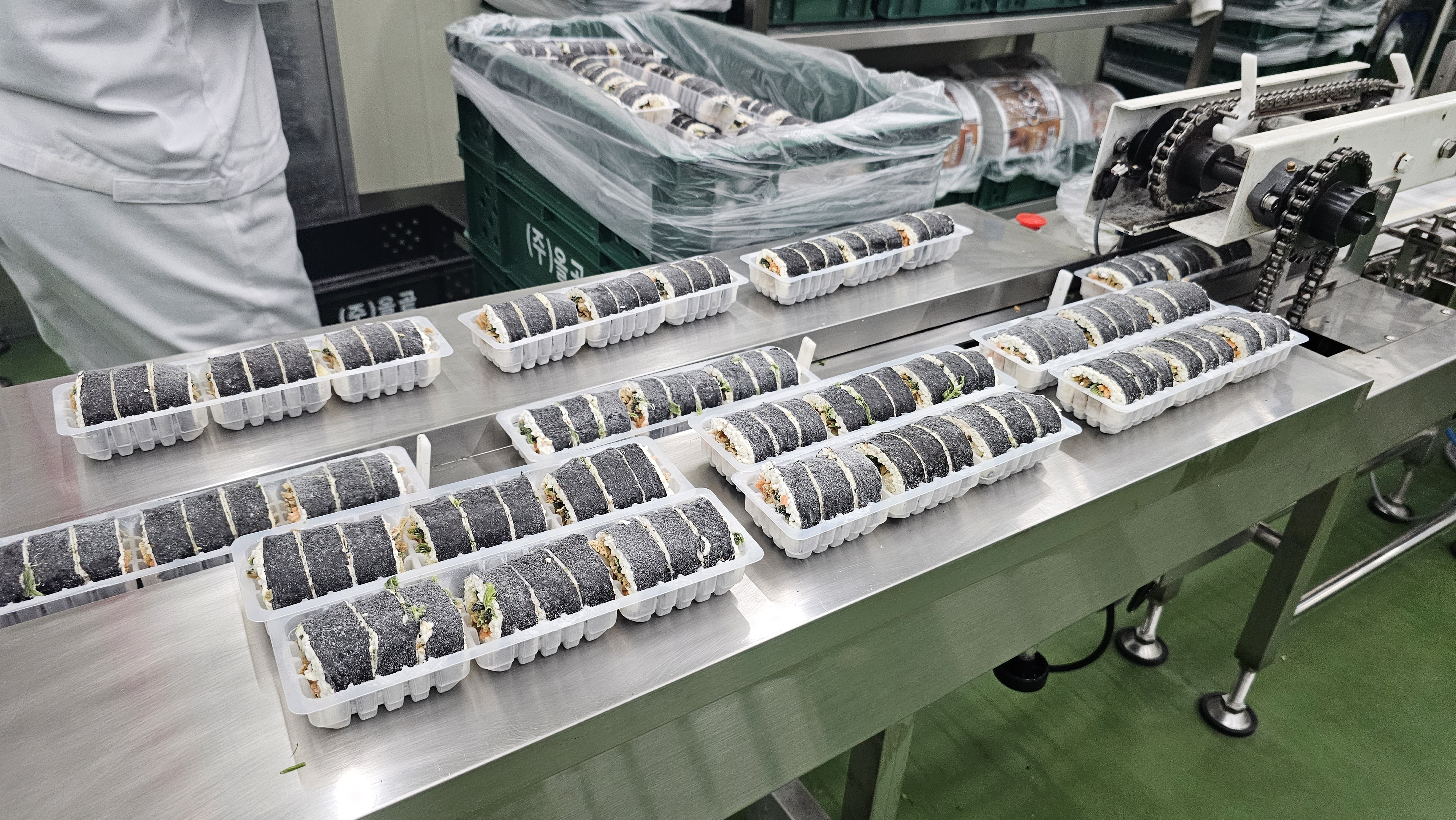
A sign reads that frozen gimbap (seaweed rice rolls) at a U.S. chain grocery store is sold out until late October due to lack of stock. (Korea Agro-Fisheries and Food Trade Corp.)
By Kim Hyelin
"Please stop buying frozen gimbap (seaweed rice rolls). I try to buy them every day but they're always sold out. I should've bought some when I had the chance," a comment said on Reddit, a major social networking site in the U.S.
The food has captivated American consumers. Gimbap made by the small domestic company Allgot has been sold out since its release in early August at a U.S. hypermarket franchise.
Certain branches limited purchase of gimbap to one per consumer, but Allgot ran out of stock nationwide within a month.
TikTok videos have fueled the snack and meal's explosive popularity. One video of Korean American food vlogger and digital creator Sarah Ahn eating frozen gimbap with her mother garnered 11 million views in just three weeks.
The U.S. broadcast network NBC on Sept. 6 posted an article headlined "Trader Joe's sold out of kimbap (gimbap), its latest viral offering, thanks to TikTok," explaining the food's immense popularity in America.

Korean American food blogger and digital creator Sarah Ahn on Aug. 16 posted a video of herself eating frozen gimbap made in Korea with her mother. (Screen capture from Ahn's TikTok account)
Interest in Hansik (traditional Korean food) is rising globally but the gimbap craze was unexpected. A Korea.net staff writer on Nov. 13 visited the famous gimbap plant in Gumi, Gyeongsangbuk-do Province, to see why the rolls made there enthrall consumers.
The facility was three hours away from Yeongdeungpo Station in Seoul by ITX Train. Upon arrival at the entrance, the writer was greeted by a strong scent of warm and sweet burdock root.
She wore shoes worn only at the plant, changed into sanitary gown and cap, and opened the door to the production line. The fragrant smell of burdock at the entrance was mixed with that of sesame oil, further stimulating her olfactory sense, while one side that had trimmed spinach and orange carrots caught her eye.
The workers stuffed gimbap with filling and machines rolled and cut them into uniform size. The pieces were placed on plastic trays, quickly frozen and packaged. The harmony between human effort and machine precision kept churning out the rolls.


Completed gimbap (top) is molded and those frozen are put in plastic trays (bottom). (Kim Hyelin)
Curious about the taste, the writer heated a roll in a microwave and ate it. It tasted much fresher than expected.
This method usually sucks out moisture from the filling to make the food soggy, but the roll, which she tasted after it cooled, had good texture in its vegetables and rice and retained the aroma of the ingredients.
"The more time used to freeze gimbap, the more moisture evaporates and the texture deteriorates after thawing, but we minimized moisture loss through our technology of freezing gimbap within 45 minutes," Allgot CEO Lee Ho Jin said. "We consider cooking time in a microwave, so we boil carrots and other ingredients only up to 70% before freezing."
The company's plant-based gimbap is popular among American consumers given the large vegetarian population in the U.S. and growing preference for healthy food.
Allgot's competitive price is another reason for its popularity. Nine rolls cost USD 3.99 (about KRW 5,000), or about a third of the price of gimbap ranging from USD 7-12 sold at Korean supermarkets in the U.S.

Lawyer Woo Yeong-woo, the protagonist of the hit Korean TV series "Extraordinary Attorney Woo," popularized gimbap by eating a lot of it in the ENA drama. (Screen capture from ENA's YouTube channel)
"When I go to foreign exhibitions, I see many people already aware that gimbap is different from sushi," Lee said. He added that gimbap being part of Hansik is its biggest advantage given high demand for Korean products thanks to the boom in Hallyu (Korean Wave) content such as K-dramas.
Allgot is exporting gimbap not only to the U.S. but other countries such as Mexico, Vietnam and Hong Kong. It plans to get halal and vegetarian certification soon to expand its export markets to other regions including the Middle East.
Other companies are exporting frozen gimbap. Bokmansa, which is based in Hadong-gun County, Gyeongsangnam-do Province, began exporting it to France last year in February and the U.K. in August this year.
The Ministry of Agriculture, Food and Rural Affairs released statistics showing that agri-food exports from January to October this year rose 1.2% from the same period last year. Overseas shipments of processed rice foods including frozen gimbap reached a record-high USD 176 million over the period, thus demand for domestic processed foods that effortlessly promote Korean cuisine are anticipated to grow.
kimhyelin211@korea.kr